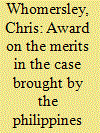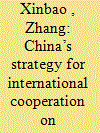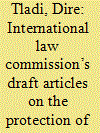|
|
|
Sort Order |
|
|
|
Items / Page
|
|
|
|
|
|
|
| Srl | Item |
| 1 |
ID:
157287


|
|
|
|
|
| Summary/Abstract |
The Tribunal constituted under UNCLOS in the proceedings brought by the Philippines against China has now rendered its Award on the Merits. This prompts two questions. First, does the Award strengthen the doubts which have been expressed about whether the Tribunal ought to have taken jurisdiction over the case? And second how cogent is the reasoning of the Tribunal on the substantive issues raised by the Philippines? This paper aims to explore both of these questions.
|
|
|
|
|
|
|
|
|
|
|
|
|
|
|
|
| 2 |
ID:
157286


|
|
|
|
|
| Summary/Abstract |
1. On 1 March 2017, the Chinese government released a document entitled “International Strategy of Cooperation on Cyberspace” (ISCC).1 The ISCC comprehensively analyzes opportunities and challenges in cyberspace, advocates “peace, sovereignty, shared governance, and shared benefits” as the basic principles of international exchange and cooperation in cyberspace, establishes six strategic goals, namely, safeguarding sovereignty and security, developing a system of international rules, promoting fair internet governance, protecting legitimate rights and interests of citizens, promoting cooperation on digital economy, and building platforms for cyber culture exchange. Accordingly, nine specific plans of action to promote international cooperation in cyberspace were formulated.
|
|
|
|
|
|
|
|
|
|
|
|
|
|
|
|
| 3 |
ID:
157289


|
|
|
|
|
| Summary/Abstract |
This Article examines the somewhat paradoxical relationship between China’s unique innovation, the suspended death sentence (sihuan zhidu), and the aim of global abolition of capital punishment. Under China’s criminal law, a two-year reprieve may be imposed together with the death sentence if the court does not find immediate execution to be necessary, and, depending on the convict’s behavior during the reprieve, the death sentence may be commuted to life or fixed-term imprisonment. The suspended death sentence may serve as a model for remaining retentionist States to emulate in their movement towards abolition because it is a potentially powerful tool of partial abolition which allows the State to increasingly isolate the use of the death penalty to the most serious crimes and gradually reduce the number of executions. However, implementing the suspended death sentence, in its current form, in retentionist States may conversely legitimate the use of the death penalty for the worst criminals who are regarded as most deserving of such punishment, and impede progress towards abolition.
|
|
|
|
|
|
|
|
|
|
|
|
|
|
|
|
| 4 |
ID:
157288


|
|
|
|
|
| Summary/Abstract |
This article concerns the ILC’s Draft Articles on the Protection of Persons in the Event of Disasters and, in particular, the establishment of a rights-duties relationship between States concerning the right to accept or refuse assistance from third States (horizontal rights-duties relationship). The article assesses the merits of the horizontal rights-duties relationship by assessing the two primary justifications for the proposition. The first justification is that the proposition reflects the law as it currently stands. The second justification is that, independent of whether the proposition reflects current law, it is morally required in order to save lives and protect the dignity of persons affected by disasters. The assessment is undertaken, principally, on the basis of the materials relied upon in the commentary to the Draft Articles as well as deliberations within the ILC itself.
|
|
|
|
|
|
|
|
|
|
|
|
|
|
|
|
| 5 |
ID:
157291


|
|
|
|
|
| Summary/Abstract |
Due to the upsurge in cross-border transaction, the movement of judgments between jurisdictions has become a hot topic. Unfortunately, China’s legislation and practice in this area has long lagged behind that of other countries, though China is not the only party to blame for the lack of a favourable Sino–foreign recognition mechanism. Encouragingly, in recent years some foreign courts have taken the initiative to recognize Chinese judgments, which Chinese courts have then responded to positively, forming a “follow-suit” circle in practice. A new opportunity has thus arrived for promoting Sino–foreign judgment recognition, and both Chinese and foreign courts should seize it, as it appears to be the most efficient and practical among possible solutions, including future domestic legislation or international treaties.
|
|
|
|
|
|
|
|
|
|
|
|
|
|
|
|
| 6 |
ID:
157290


|
|
|
|
|
| Summary/Abstract |
What is legislation? What is law? A great deal of ink has been spilled on these questions. In this essay I wish to investigate the answers that have been provided in international law. Two theses are advanced. First, there is a misunderstanding in international law about what legislation is. It is mistakenly thought that legislation is general. This misunderstanding can, for instance, be discerned in the popular claim that the United Nations Security Council has begun to “legislate” on the international plane. The second thesis attempts to specify how this misunderstanding has come about. In international law writing one commonly finds a more basic mistake about what law is—namely, the mistaken view that law is general. If these two theses are true, the literature on international law-making stands in need of revision.
|
|
|
|
|
|
|
|
|
|
|
|
|
|
|
|
|
|
|
|
|